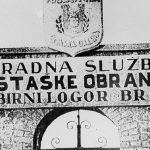ZAGREB, April 9, 2019 – Independent Democratic Serb Party (SDSS) parliamentary deputy Milorad Pupovac on Tuesday accused the national legislature, under whose auspices the commemorative events at Jasenovac and Bleiburg are held, of treating the commemorations of victims at those two sites differently.
Pupovac said that when it comes to the Jasenovac commemorations, “the Parliament behaves as if it is not the sponsor” while at Bleiburg “it behaves like a true and dedicated sponsor.”
“After the decision of the Austrian authorities that the Bleiburg commemorative event should be banned in the form it has been held to date, all the authorities in Croatia – the government and the church authorities as well as the parliament – have done their best to negotiate terms for the commemorative event to be held (this May), promising compliance with Austrian laws banning the glorification of Fascist and Ustasha ideas, symbols and messages,” Pupovac said.
He went on to say that in Croatia, too, laws banning Fascist and Ustasha symbols were in force. Pupovac, however, insists that Croatia “is readier to honour the laws of another country than its own”.
He also mentioned the case of the municipality of Slatinski Drenovac where there used to be a street named after the date when the Nazi-style Independent State of Croatia (NDH) was established and the 2017 ruling of the Constitutional Court declaring that name to be contrary to the Constitution.
In 2017, the Court concluded that the street name “April 10” in Slatinski Drenovac, a village in the Slavonia region, was unconstitutional, underlining that it was “a well-known historical fact” that the NDH was a Nazi and Fascist entity and that present-day Croatia was not its successor on any grounds.
Pupovac’s speech was interrupted on several occasions by MP Željko Glasnović who also later claimed that in that municipality in the 1990s “some 500 skulls of Croats (killed in World War II) were unearthed from the basement of the local Orthodox Church”, insisting that that was “the first Partizan-run concentration camp”.
Pupovac then said that those killed at Jasenovac “were not responsible for the death of any person killed at Tezno, Kočevski Rog or Macelj, whereas many killed there were guilty of the deaths of hundreds of thousands of people slain across the NDH.”
Pupovac said that instead of applying Croatian laws, “we tolerate in our country the revival of conflicts based on topics relating to the Second World War.”
Deputy Parliament Speaker Milijan Brkić, who chaired the session, warned Glasnović against interrupting another deputy’s speech, and called on Pupovac and other MPs not to argue over the topic of paying tribute to war victims.
“A crime is a crime regardless of who has committed it,” Brkić said, calling for not making a distinction between victims.
More news about the status of Serbs in Croatia can be found in the Politics section.








